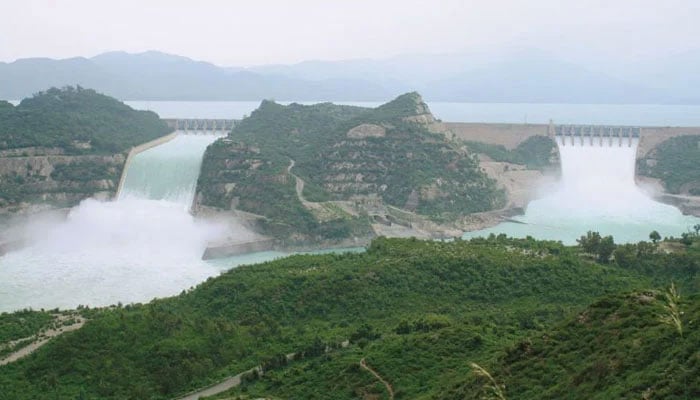IRSA unswayed by Wapda view on Tarbela dam constraints
All provinces in the technical committee were in agreement about the water inflows in the system
ISLAMABAD: The Water and Power Development Authority (Wapda) on Monday failed to satisfy the technical committee of Indus River System Authority (IRSA) on water release from Tarbela Dam through low-level outlets, irritating the representative of the lower riparian province of Sindh, where the sowing of cotton begins in the early Kharif.
The IRSA technical committee met here with the Director of Operations of IRSA, Mr. Khalid Idrees Rana, to finalise the preliminary findings about water availability in the Kharif season. However, Wapda has been asked to come up with a detailed presentation on Tarbela Dam constraints for the advisory committee that will meet on April 2, 2024.
Five members of IRSA, secretaries of irrigation and power departments of four provinces, and Wapda member water and power would attend the advisory committee to finalise the water availability in the country during the Kharif season.
However, the IRSA technical committee that met on Monday finalised the parameters that will be run on the software today (Tuesday) to find out the water availability figures, keeping in view the MET office’s input.
All provinces in the technical committee were in agreement about the water inflows in the system, reservoirs’ filling timelines, and flow monitoring. IRSA asked the provinces of Punjab and Sindh to make their discharge observation cells (DOCs) functional. Sindh has already set up its cells at Chashma, Taunsa, Punjnand, and Jinnah Barrage to monitor flows to Punjab, and likewise, Punjab has set up cells at Sukkur, Kotri, and Guddu to monitor the flows destined to reach Sindh. This setup has been developed to do away with the misunderstanding about the water theft between the two provinces. In the meeting, both Punjab and Sindh agreed to make their cells functional within one month.
However, in the meeting, the presentation by Wapda on its three tunnel projects (T-3, T-4, and T-5) ensuring water releases from low-level outlets failed to satisfy the participants. According to IRSA officials, Wapda failed to complete its tunnel projects even after the deadlines passed, which is why the Indus River System Authority will not be able to draw water from low-level intakes.
-
 Savannah Guthrie Expresses Fresh Hope As Person Detained For Questioning Over Kidnapping Of Nancy
Savannah Guthrie Expresses Fresh Hope As Person Detained For Questioning Over Kidnapping Of Nancy -
 ByteDance Suspends Viral Seedance 2.0 Photo-to-voice Feature: Here’s Why
ByteDance Suspends Viral Seedance 2.0 Photo-to-voice Feature: Here’s Why -
 Tom Hanks Diabetes 2 Management Strategy Laid Bare
Tom Hanks Diabetes 2 Management Strategy Laid Bare -
 Bad Bunny Wins Hearts With Sweet Gesture At Super Bowl Halftime Show
Bad Bunny Wins Hearts With Sweet Gesture At Super Bowl Halftime Show -
 Why Angelina Jolie Loves Her 'scars' Following Double Mastectomy
Why Angelina Jolie Loves Her 'scars' Following Double Mastectomy -
 ‘World Is In Peril’: Anthropic AI Safety Researcher Resigns, Warns Of Global Risks
‘World Is In Peril’: Anthropic AI Safety Researcher Resigns, Warns Of Global Risks -
 Meghan Markle Receives Apology As Andrew Puts Monarchy In Much Bigger Scandal
Meghan Markle Receives Apology As Andrew Puts Monarchy In Much Bigger Scandal -
 Catherine O’Hara Becomes Beacon Of Hope For Rectal Cancer Patients
Catherine O’Hara Becomes Beacon Of Hope For Rectal Cancer Patients -
 Nancy Guthrie: Is She Alive? Former FBI Director Shares Possibilities On 10th Day Of Kidnapping
Nancy Guthrie: Is She Alive? Former FBI Director Shares Possibilities On 10th Day Of Kidnapping -
 Siemens Energy Profit Surges Nearly Threefold Amid AI Boom For Gas Turbines, Grids
Siemens Energy Profit Surges Nearly Threefold Amid AI Boom For Gas Turbines, Grids -
 TikTok's ByteDance To Develop Advance AI Chips With Samsung
TikTok's ByteDance To Develop Advance AI Chips With Samsung -
 Princess Beatrice, Eugenie In Dilemma As Andrew, Fergie Scandal Continues
Princess Beatrice, Eugenie In Dilemma As Andrew, Fergie Scandal Continues -
 Tumbler Ridge School Shooting Among Canada’s Deadliest — Here’s Where It Ranks
Tumbler Ridge School Shooting Among Canada’s Deadliest — Here’s Where It Ranks -
 Suspect Detained As Authorities Probe Nancy Guthrie’s Abduction
Suspect Detained As Authorities Probe Nancy Guthrie’s Abduction -
 Tumbler Ridge Tragedy: Nine Killed, 25 Injured After School Shooting In British Columbia
Tumbler Ridge Tragedy: Nine Killed, 25 Injured After School Shooting In British Columbia -
 FDA Sends 'refusal-to-file' To Moderna Over New Flu Vaccine
FDA Sends 'refusal-to-file' To Moderna Over New Flu Vaccine




